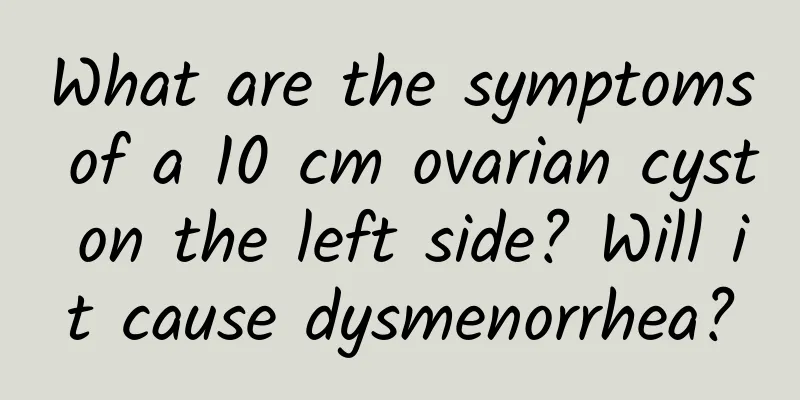Urine bleeding in the elderly after menopause

|
Urinary bleeding in the elderly after menopause may be caused by a variety of reasons, including urinary tract infection, tumors, urinary tract stones or other diseases, which need to be taken seriously and treated promptly. Common causes include infectious diseases, reproductive organ lesions and tumors. After the diagnosis is clear, intervention can be carried out through anti-infection treatment, surgery or drugs. At ordinary times, attention should be paid to hygiene and eating habits. 1. Urinary tract infection Due to the decline in estrogen levels in postmenopausal women, the mucous membranes of the vagina and urethra become thinner and their defenses are reduced, which can easily lead to urinary tract infections, resulting in blood in the urine and symptoms such as frequent urination, urgency, and pain when urinating. Urinalysis and urine culture are usually required to confirm the specific pathogens of the infection, and then effective antibiotics such as norfloxacin, amoxicillin, or sulfonamides are used according to the results. It is also recommended to drink plenty of water to promote urination and help flush the bladder. 2. Tumors or proliferative lesions Malignant tumors of the urinary or reproductive system may cause blood in the urine, including bladder cancer, urethral cancer, and endometrial cancer, which are usually accompanied by other symptoms such as local pain and difficulty urinating. This needs to be further confirmed by cystoscopy, B-ultrasound or CT examination. Surgical resection is the main treatment method, and radiotherapy or chemotherapy may be required. There are also benign hyperplasias, such as bladder polyps, which can be removed through minimally invasive surgery and recover faster. 3. Urinary system stones Urinary stones rubbing against the urethral wall may cause blood in the urine, often accompanied by severe pain in the waist and abdomen, and some patients may also have renal colic. In medicine, ultrasound or CT scans are often used to determine the location and size of stones. Minor stones can be relieved by drugs such as stone removal particles and drinking more water, while larger stones require treatment such as extracorporeal shock wave lithotripsy or percutaneous nephrolithotomy. 4. Genital atrophy, trauma or other factors Insufficient estrogen during menopause can easily lead to atrophy of the reproductive organs, and damage to the urethral opening may cause hematuria during urination. Improper trauma, excessive force, etc. may also be one of the causes. In mild cases, topical ointments or estrogen drugs can be used under the guidance of a doctor to repair the damage. In severe cases, surgical correction and auxiliary treatment are required. Urine bleeding after menopause is an abnormal manifestation that cannot be ignored. Whether it is a mild symptom or a serious lesion, you should go to the hospital as soon as possible to have a urinary system examination or a gynecological examination to determine the cause. Pay attention to personal hygiene, keep the lower body clean and dry, eat a balanced diet and exercise moderately to enhance immunity. |
<<: Can moxibustion treat vulvar pruritus?
>>: What causes uterine cysts? Do they need treatment?
Recommend
Will the right ovarian cyst disappear? What are the symptoms?
Will the right ovarian cyst disappear? What are t...
How to treat gynecological uterine fibroids? Who are the people who are prone to gynecological uterine fibroids?
Compared with the increasingly comfortable life n...
How to quickly relieve vulvar itching?
The causes of vulvar itching are different, and t...
Common symptoms of mild cervical erosion
Cervical erosion is a manifestation of chronic ce...
Causes of irregular menstruation in women
Irregular menstruation is a common phenomenon in ...
Is uterine fibroid a malignant tumor? What is the best way to treat uterine fibroid?
What is the best way to treat uterine fibroids? U...
Wang Siping stepped hard on the flywheel in March to get rid of his calves
"Have you noticed? My calves have really got...
What medicine can be applied to uterine fibroids? Is there any external medicine for uterine fibroids?
Uterine fibroids are one of the most common tumor...
Good news! Eating eggs for breakfast can curb obesity
The main source of protein for humans comes from ...
Lazy man's weight loss technique! Sleep weight loss method to supplement the right amino acids and lose weight
Often stay up late and eat midnight snacks to rel...
Are uterine fibroids and ovarian cysts the same? What are the symptoms of ovarian cysts?
Ovarian cysts and uterine fibroids are very commo...
How to treat bacterial vaginosis
How is bacterial vaginosis treated? Generally, ac...
What should women eat when they have uterine fibroids?
What should women eat if they have uterine fibroi...
Is it normal for a 16 year old to have ovulation bleeding?
Ovulation bleeding at the age of 16 is also a nor...
Introduction to two common ectopic pregnancy surgeries
Some mild ectopic pregnancies can be treated with...









